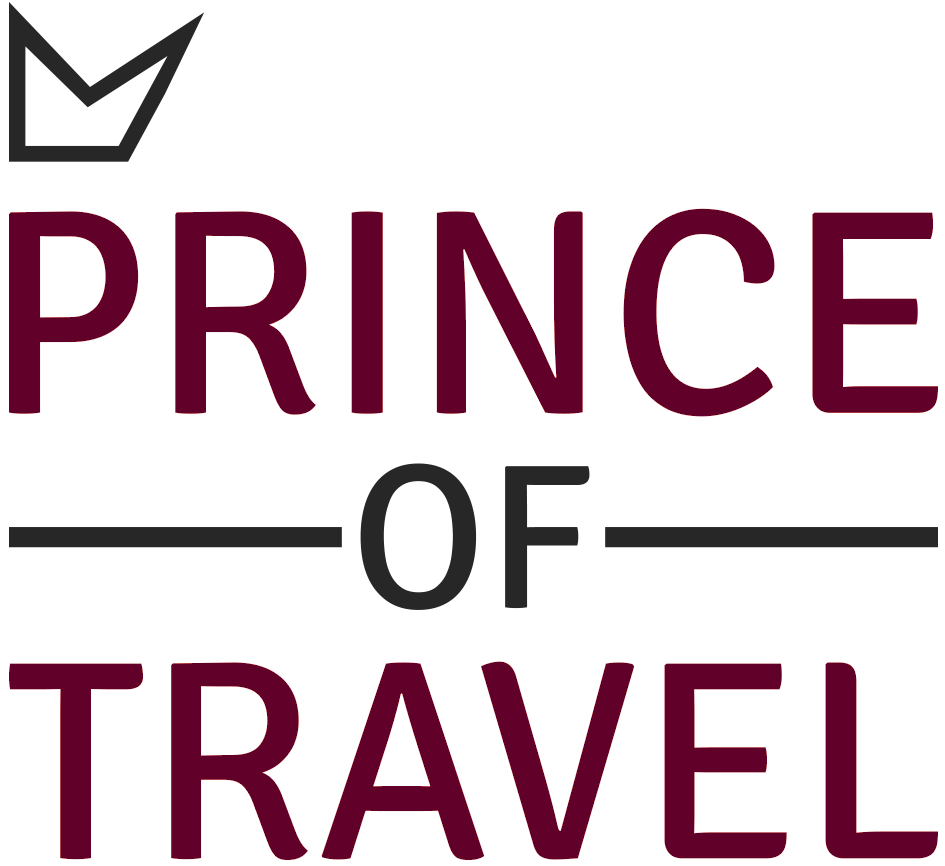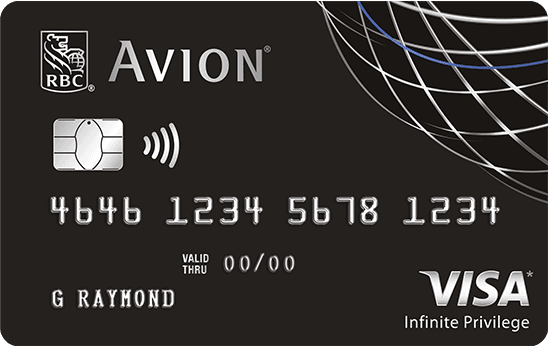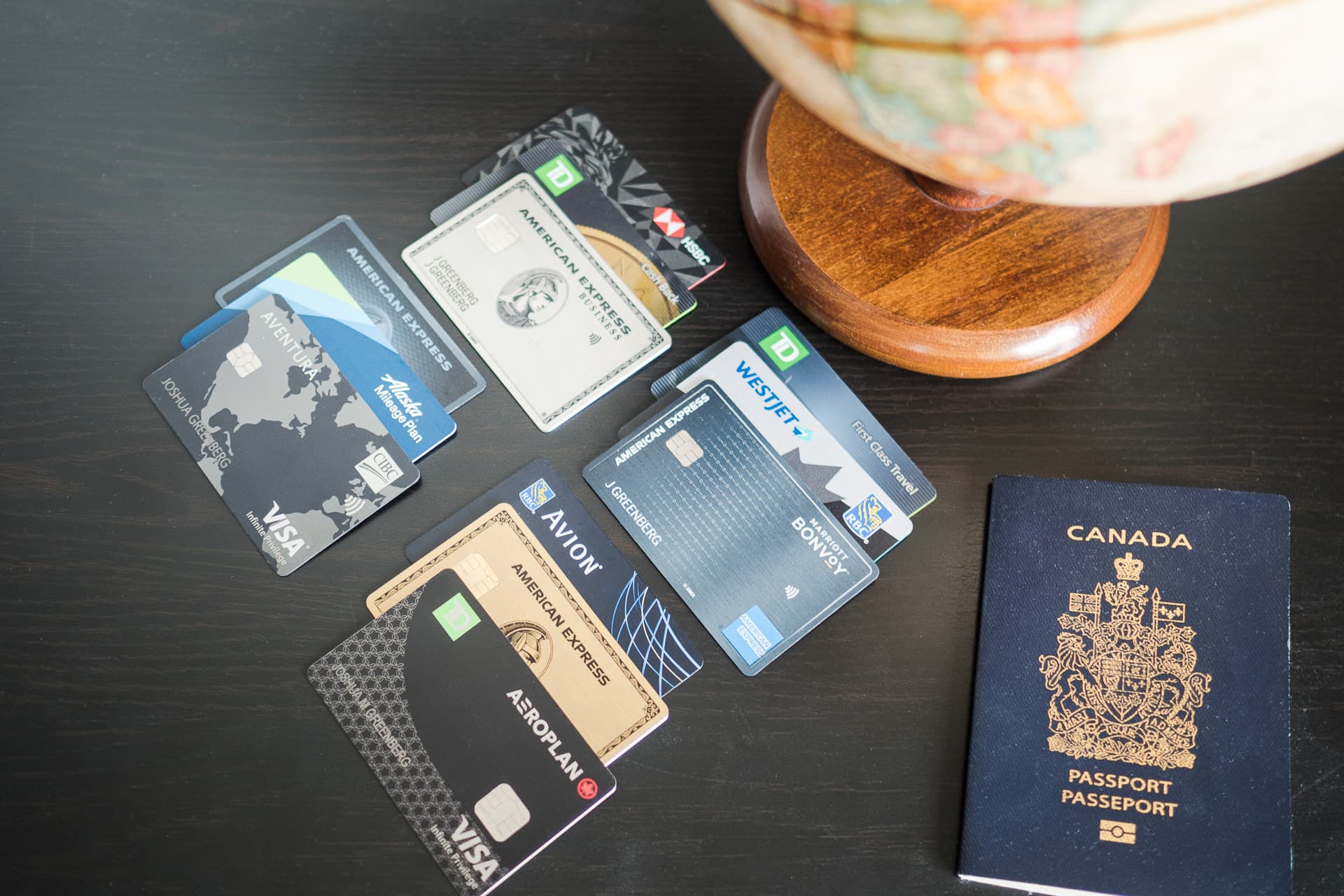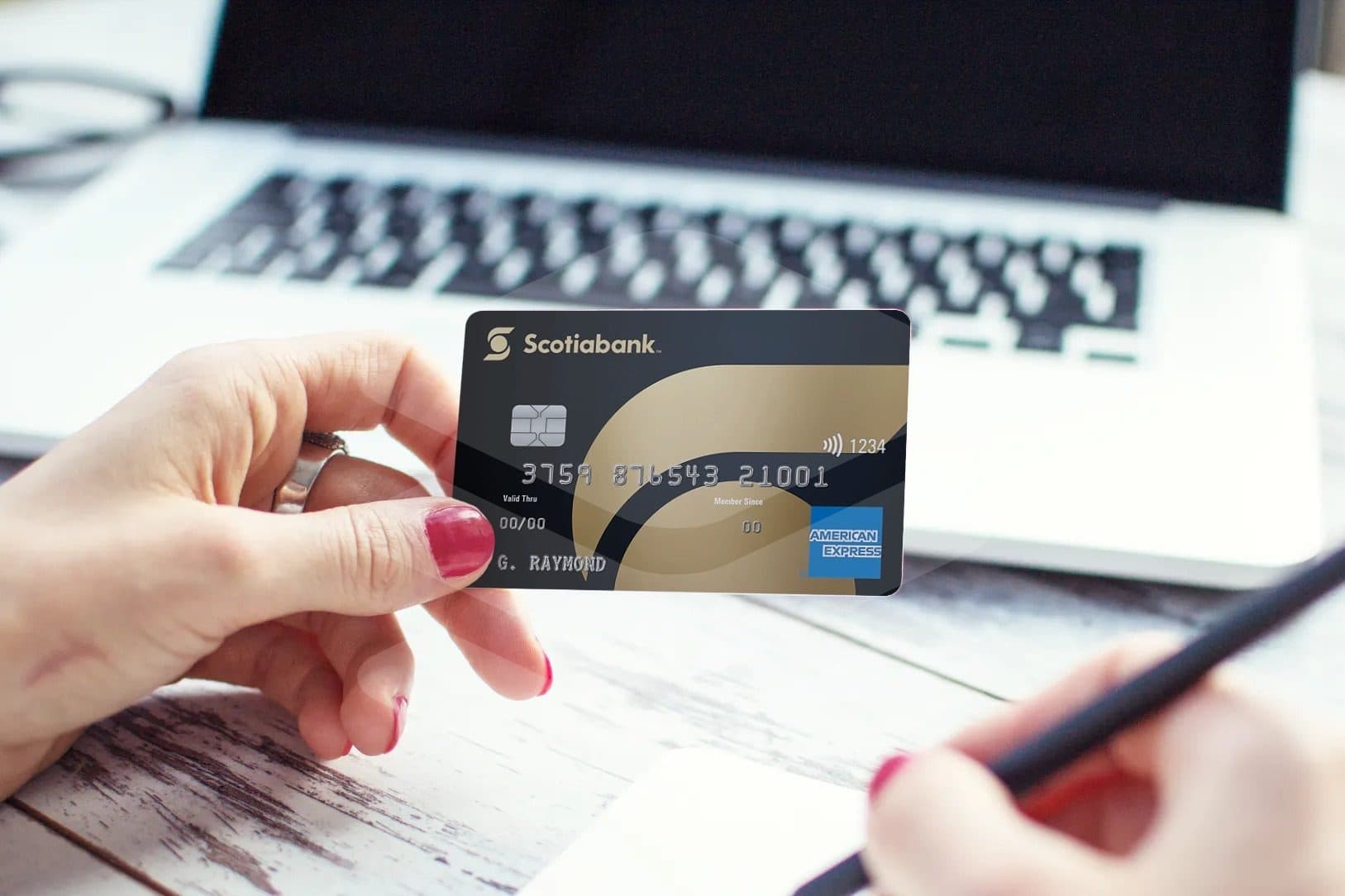Canada's 8 Best RBC Credit Cards
Last updated February 13, 2026

Best RBC Credit Cards
RBC is one of Canada’s leading Big 5 banks, offering a variety of travel and cash back credit cards.
Here are our picks for the best RBC credit cards in Canada.
Best Overall RBC Credit Card
First-year value
$1,080
Annual fee: $120
• Earn 35,000 points on approval
• Earn 20,000 points upon spending $5,000 in the first 6 months
Earning rates
Key perks
- Transfer to BA Avios, Cathay, WestJet, AA
- DoorDash DashPass for 12 months
- Petro-Canada 3c/L savings + 20% bonus Petro-Points

Annual fee: $120
• Earn 35,000 points on approval
• Earn 20,000 points upon spending $5,000 in the first 6 months
Earning rates
Key perks
- Transfer to BA Avios, Cathay, WestJet, AA
- DoorDash DashPass for 12 months
- Petro-Canada 3c/L savings + 20% bonus Petro-Points
The RBC® Avion Visa Infinite† is RBC’s core travel credit card. You’ll earn 1.25 Avion points per dollar spent on travel, and 1 point per dollar spent on all other purchases.
Avion points are one of the few transferable rewards currencies in Canada, making them very valuable. There are some good sweet spots with any of their transfer partners, including British Airways Avios, Cathay Pacific Asia Miles, and American Airlines AAdvantage. It’s often best to wait for a transfer bonus, which could net you 10–50% more points depending on the partner program.For straightforward round-trip flights in economy class, you can also score great value with the Air Travel Redemption Schedule. You can redeem your rewards for up to 2 cents per point for most destinations. If you book this way through the RBC Rewards centre, you can also use your points to cover taxes and fuel surcharges.
As an added bonus, RBC has special promotions for Avion cardholders. Check the offers on your account from time to time, and you can earn discounts or additional Avion points for using your card to make purchases at merchants like Best Buy, Indigo, Apple, Rexall, or HelloFresh. There’s also an ongoing benefit of discounts and extra points at Petro-Canada.
The card also has some unique insurance benefits, like a high amount of hotel burglary coverage and mobile device insurance. A mid-tier card with a manageable annual fee, the RBC Avion card is always useful to have in your wallet for those types of purchases and bookings.
If you don’t qualify with at least $60,000 annual personal income or $100,000 annual household income, you can apply for the RBC® Avion Visa Platinum†. You’ll get all of the same earning and redemption opportunities (except for bonus points earned on travel purchases) and the same annual fee, just with no minimum income requirement.
Best Premium RBC Credit Card
First-year value
$826
Annual fee: $399
• Earn 35,000 points on approval
• Earn 20,000 points upon spending $5,000 in the first 6 months
• Earn 15,000 points on card anniversary in the first 12 months
Earning rates
Key perks
- 6 Visa Airport Companion lounge visits per year
- Priority security at Toronto Billy Bishop, Montreal, Ottawa
- Visa RSVP Diamond at 60+ Sandman/Sutton hotels
- Troon Rewards Platinum (20% off at 150+ golf courses)
- Transfer to BA Avios, Cathay, WestJet, AA
- DoorDash DashPass for 12 months
Annual fee: $399
• Earn 35,000 points on approval
• Earn 20,000 points upon spending $5,000 in the first 6 months
• Earn 15,000 points on card anniversary in the first 12 months
Earning rates
Key perks
- 6 Visa Airport Companion lounge visits per year
- Priority security at Toronto Billy Bishop, Montreal, Ottawa
- Visa RSVP Diamond at 60+ Sandman/Sutton hotels
- Troon Rewards Platinum (20% off at 150+ golf courses)
- Transfer to BA Avios, Cathay, WestJet, AA
- DoorDash DashPass for 12 months
The RBC® Avion Visa Infinite Privilege† is RBC’s top-tier card. It’s a step up from their other cards, earning 1.25 Avion points per dollar spent on all purchases.
As for travel benefits, you’ll get a better insurance package, as well as a complimentary DragonPass membership with six annual free lounge visits, as is standard on all Visa Infinite Privilege cards.
But perhaps the most intriguing advantage of this card is that you can redeem your Avion rewards at a rate of 2 cents per point for any business class flight. If you can find some cheap cash fares, you can score some flights this way for even better value than you might find with frequent flyer programs.
Best RBC Mastercard
First-year value
$386
Annual fee: $139
• Earn 25,000 points on first purchase
• Earn 20,000 points upon spending $5,000 in the first 3 months
Earning rates
Key perks
- Annual companion voucher ($119–$499 companion base fare)
- Status Lift: $200 TQS per $5,000 spend (up to 50/year)
- Free first checked bag for cardholder + up to 8 guests
- Exchange option: 30% flight discount, $200 WJ Vacations credit, or 2 lounge passes

Annual fee: $139
• Earn 25,000 points on first purchase
• Earn 20,000 points upon spending $5,000 in the first 3 months
Earning rates
Key perks
- Annual companion voucher ($119–$499 companion base fare)
- Status Lift: $200 TQS per $5,000 spend (up to 50/year)
- Free first checked bag for cardholder + up to 8 guests
- Exchange option: 30% flight discount, $200 WJ Vacations credit, or 2 lounge passes
The WestJet RBC® World Elite Mastercard is RBC’s go-to travel-oriented Mastercard.
You’ll earn 1.5 WestJet points per dollar spent on most purchases, which is equivalent to a 1.5% return, or 2 WestJet points per dollar spent on WestJet purchases (2% return). You can use your rewards to cover payments for WestJet flights or WestJet Vacations.
The card’s best feature is its annual companion voucher. Every year, including your first year with the card, you can book a second round-trip ticket with a reduced base fare when you pay full price for your own seat.
You’d still have to pay $119–499 plus taxes and fees, depending on the destination and class of service, but these rates can represent steep discounts if you travel in high season.
Best RBC Credit Card for Daily Spending
First-year value
$450
Monthly fee: $4First Year Free
• Earn 7,000 points on approval
• Earn 14,000 points upon spending $1,500 in the first 6 months
Earning rates
Key perks
- Transfer to BA Avios, Cathay, WestJet, AA
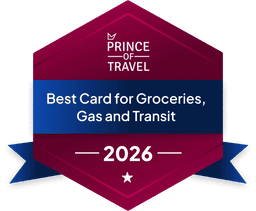
Monthly fee: $4First Year Free
• Earn 7,000 points on approval
• Earn 14,000 points upon spending $1,500 in the first 6 months
Earning rates
Key perks
- Transfer to BA Avios, Cathay, WestJet, AA
The RBC® ION+ Visa is an intriguing option for spenders who want to earn enticing travel rewards while keeping credit card fees down.
The card has a monthly fee of just $4, while earning a hefty 3 points per dollar spent on a wide range of lifestyle categories, including groceries, dining, commuting, and entertainment subscriptions.
As an ION+ cardholder, you'll earn points at the Avion Premium tier. Aside from WestJet, you can’t transfer these points to airline partners or use the Air Travel Redemption Schedule. As an ION+ cardholder, you’ll miss out on the very best ways to stretch your value with the trio of oneworld airline programs of British Airways Avios, Cathay Pacific Asia Miles, and American Airlines AAdvantage.
Luckily, you can easily upgrade the card to an Avion card. This moves your cardholder status to Avion Elite, which lets you transfer Avion Rewards points to frequent flyer programs.
If you have an RBC® ION+ Visa and an Avion Visa, you can easily transfer your points earned at the Premium tier into Avion points at the Elite tier. This is an ideal setup, as you can earn at elevated rates with the RBC® ION+ Visa, while redeeming in the most valuable ways at the Elite tier.
Indeed, this is what we refer to as The Optimized RBC Credit Card Portfolio: earn with the great rates on the RBC® ION+ Visa, and redeem with the power of the Avion Elite membership tier as an Avion cardholder.
Best No Fee RBC Credit Card
First-year value
$230
No annual fee
• Earn 4,000 points on approval
• Earn 7,000 points upon spending $500 in the first 3 months
Earning rates
Key perks
- Transfer to BA Avios, Cathay, WestJet, AA
No annual fee
• Earn 4,000 points on approval
• Earn 7,000 points upon spending $500 in the first 3 months
Earning rates
Key perks
- Transfer to BA Avios, Cathay, WestJet, AA
The RBC® ION Visa is the best entry-level card offered by RBC. You can earn 1.5 points per dollar spent on groceries, dining, and other lifestyle categories, and 1 point per dollar spent everywhere else.
You can redeem your Avion Rewards points for gift cards at a rate of 1 cent per point, although with frequent discounts of 30%, you can often get a rate of 1.43 cents per point. If you wait for these promotions, you can significantly increase your returns on daily spending, which you can’t do on most no-fee cards.
Otherwise, like with the ION+ card, you can upgrade the ION card to an Avion card to take advantage of exclusive airline transfer partners available to Avion cardholders, or hold both and transfer your points into the Elite tier.
If you can’t qualify for a higher-tier card initially, the ION card is a great starting point as you begin making plans for future travel with the three oneworld programs.
Best Cash Back RBC Credit Card
First-year value
$80
No annual fee
• Earn 0.07x bonus points on purchases (up to $1,000 spend)
Earning rates
Key perks
- Petro-Canada 3c/L savings
No annual fee
• Earn 0.07x bonus points on purchases (up to $1,000 spend)
Earning rates
Key perks
- Petro-Canada 3c/L savings
The RBC® Cash Back Mastercard has an interesting rewards structure. Your earn rates will vary depending on how much you spend in different categories.
You’ll earn 2% cash back on your first $6,000 of grocery purchases each year; then your rewards rate drops to 1%. You’ll also earn 0.5% on your first $6,000 of other purchases each year; then your rewards rate increases to 1%.
If most of your spending is on groceries, you’ll be hard-pressed to find a no-fee card that earns more than 2%. And if you exceed $500 per month on average, at that level you’re probably better off swallowing a modest fee for bigger rewards.
If you’re a high-volume spender in other categories and you’ll easily reach the 1% rate, that’s a great return for an entry-level cash back card that doesn’t face the same acceptance issues as American Express cards.
Best RBC Credit Card for International Travel
First-year value
$1,135
Annual fee: $165
• Earn 30,000 points upon spending $5,000 in the first 3 months
• Earn 30,000 points upon spending $5,000 in the first 6 months
Earning rates
Key perks
- Companion eVoucher upon $30,000 annual spend (companion flies round-trip on BA)
- 10% off BA roundtrip fares via ba.com/RBC10
- Automatic BA Executive Club enrollment
Annual fee: $165
• Earn 30,000 points upon spending $5,000 in the first 3 months
• Earn 30,000 points upon spending $5,000 in the first 6 months
Earning rates
Key perks
- Companion eVoucher upon $30,000 annual spend (companion flies round-trip on BA)
- 10% off BA roundtrip fares via ba.com/RBC10
- Automatic BA Executive Club enrollment
The RBC® British Airways Visa Infinite† is a unique offering in the Canadian market: the only co-branded British Airways Avios credit card in Canada.
With a welcome bonus of 60,000 Avios after spending $10,000 in the first six months, you'll have enough for several short-haul awards or a solid head start on a long-haul premium cabin booking through oneworld airlines like British Airways, Cathay Pacific, Qantas, or Japan Airlines.
Avios are among the most versatile frequent flyer currencies in the world. Thanks to British Airways' distance-based award chart, you can score exceptional value on short-haul flights — think 7,500 Avios for a one-way flight within North America on American Airlines, or 12,500 Avios for transcontinental flights.
Big spenders also have a reason to keep the card long-term: after spending $30,000 in a calendar year, you'll earn a companion award eVoucher, allowing a second person to fly for just the taxes and fees on a Avios redemption. That's a perk you won't find on any other RBC card.
At a modest annual fee of $165 with a free additional card, this is a compelling option for anyone who wants to tap into the oneworld alliance without holding an Avion card.
Best RBC Credit Card for Business Owners
First-year value
$700
Annual fee: $175First Year Free
• Earn 35,000 points on approval
Earning rates
Key perks
- Transfer to BA Avios, Cathay, WestJet, AA
Annual fee: $175First Year Free
• Earn 35,000 points on approval
Earning rates
Key perks
- Transfer to BA Avios, Cathay, WestJet, AA
The RBC® Avion Visa Infinite† Business is the go-to choice for business owners looking to rack up points for business travel.
You can transfer your Avion points to RBC’s oneworld airline partners, use the RBC Air Travel Redemption Schedule for economy flights, or credit your points against any business class flight at a rate of 2 cents per point.
The card earns 1.25 Avion points per dollar spent on your first $75,000 in purchases per year, or 1 point thereafter. It also comes with a solid suite of travel insurance coverage.
You can have these unique high-value perks like extra Avion points on spending and 2 cents per point redemptions for premium class tickets, all for an annual fee of just $175.
Compared to the RBC® Avion Visa Infinite Privilege† and its $399 annual fee for those same benefits, you should definitely see if you have an opportunity to get this business credit card instead.
RBC Credit Cards: What You Need to Know
When choosing an RBC credit card, you should familiarize yourself with what benefits a RBC credit card can offer, what features to look out for, and how RBC credit cards can fit into an optimized overall credit card strategy.
Why get an RBC credit card?
Overall, RBC’s credit cards have modest welcome bonuses and everyday earn rates. Instead, the biggest appeal is their unique airline partners.
RBC Avion points are transferable to frequent flyer programs with three airlines (British Airways, Cathay Pacific, and American Airlines) that are members of the oneworld alliance. You can then book partner award space from these loyalty programs. RBC also has co-branded credit cards for British Airways and Cathay Pacific.
This gives you some new options for travel, as other Canadian banks put more of an emphasis on Air Canada’s Aeroplan program and its Star Alliance partners. Also, RBC is the only Big 5 Canadian bank with a transferable points currency, offering both flexibility and the potential for very high value redemptions.
Additionally, RBC opens the door to the SkyTeam alliance. Although WestJet isn’t a member, they have codeshare agreements with several SkyTeam airlines like Delta, Air France, and KLM, and you can use WestJet points on those routes. Whether with the co-branded WestJet RBC® World Elite Mastercard or by transferring RBC Avion points, there are quite a few ways to earn WestJet points from RBC.
As the cherry on top, RBC runs promotions where you can get a 10–50% bonus for transferring points to airlines or redeeming them for gift cards. Other banks don’t do this as often, if at all, and it’s rare to be able to exchange points for gift cards at a similar value as travel redemptions.
Finally, if you bank with RBC, you can get a MultiProduct Rebate if you have an RBC credit card. Since it reduces your monthly banking fees, there’s no reason not to have a card, even if it’s just a basic one with no annual fee.
What should you look for in an RBC credit card?
RBC has a mix of cards for different purposes:
- RBC’s Mastercards include their WestJet co-branded cards and cash back cards
- RBC’s Visa cards make up the rest of their travel products, including the full Avion Rewards line as well as a co-branded card with British Airways.
RBC’s primary travel rewards program is officially known as Avion Rewards. As a cardholder of any credit card that earns Avion points, you’re an Avion Elite member, meaning you can redeem points for travel bookings, merchandise, gift cards, or WestJet points. Travel redemptions booked through Avion Rewards can be made for 1 cent per point.
Meanwhile, Avion-branded credit cards are a subset of Avion Rewards. These cardholders are considered Avion Elite members with additional premium travel redemption options:
- All Avion cardholders can use the Air Travel Redemption Schedule, a region-based chart with fixed points prices for round-trip travel between Canada and each zone. You can book any seat on any flight, up to a maximum cash fare. If you’re able to maximize the chart’s sweet spots, you should expect to be able to redeem your rewards for around 2 cents per point.
- All Avion cardholders can transfer points to British Airways Avios, Cathay Pacific Asia Miles, or American Airlines AAdvantage.
- Visa Infinite Privilege and Visa Infinite Business cardholders can also use points for business class and First Class flights, at a fixed rate of 2 cents per point, with no limit per booking. This can be a very lucrative upgrade from the regular rewards rate of 1 cent per point for all travel bookings.
Aside from transferring your Avion points, you can earn airline miles directly on a British Airways or Cathay Pacific co-branded card, if you’d prefer.
All of RBC’s cards come with the standard benefits for their card tier:
- All Visa Infinite cards have access to Concierge services, the Luxury Hotel Collection, and the Dining Series & Wine Country program
- In addition, Visa Infinite Privilege cards come with a DragonPass membership which includes six annual visits to participating airport lounges and restaurants each year
- All World Elite Mastercards come with a DragonPass membership (although no free passes from RBC) and a FlexiRoam eSIM for international data roaming
RBC frequently offers First Year Free promotions or larger welcome bonuses for new signups for their Avion Visa Infinite and WestJet World Elite cards. It’s generally best to wait for one of these opportunities before applying.
If your personal or household income isn’t high enough to qualify, see if you’re eligible for a lower-income variant of the same card.
Often RBC will have the same offer for both cards, or downgrade your application for the premium product if necessary, so you can still earn many of the same perks and welcome bonuses.
What’s the optimal strategy for RBC credit cards?
RBC offers the most powerful rewards and travel benefits among the Big 5 Canadian banks, and is second only to American Express credit cards among all Canadian issuers.
If you’re a dedicated traveller who wants to see as much of the world as possible by maximizing your credit cards, RBC credit cards should have a significant presence in your wallet.
For international travellers, by transferring Avion points to one of the oneworld airline partners (often with a 10–50% transfer bonus) or by earning miles directly with the British Airways or Cathay Pacific co-branded cards, you can redeem miles for long-haul international flights for a much higher value than by redeeming Avion points for flights directly.
For domestic travellers, booking flights through the Air Travel Redemption Schedule and collecting WestJet points can help you cover a fair chunk of your domestic flights, too.
While the individual welcome bonuses on each RBC credit card might not be world-beating, there are quite a few different RBC credit cards you can apply for, and you can stack all of these welcome bonuses into a concentrated points balance in either Avion or one of the partner programs (Avios, Asia Miles, AAdvantage, or WestJet).
Frequently Asked Questions
Below are some questions we frequently hear from readers about the best RBC credit cards in Canada.
Can I have more than one RBC credit card at the same time?
Yes, but you can typically only be approved for one card every 90 days. If you apply sooner, you’ll almost certainly be automatically rejected, and the 90-day waiting period will reset.
Which credit bureau does RBC check?
RBC always checks TransUnion.
Can I get RBC business cards?
Yes, you can easily apply as a sole proprietor doing business as your own name. However, expect RBC to ask for business registration documents.
†Terms and conditions apply. Refer to the RBC website for complete, up-to-date information.
